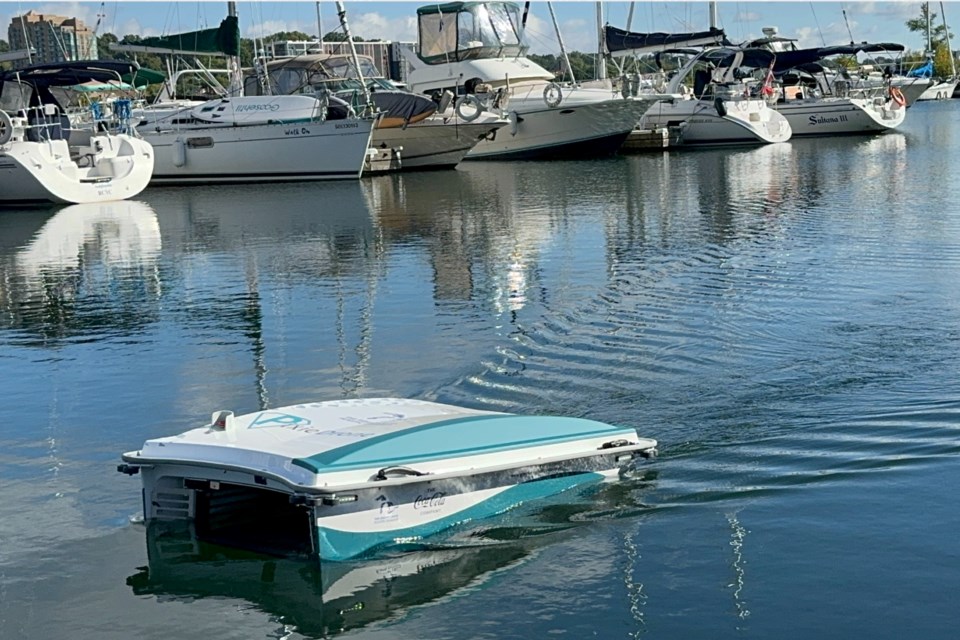There was something strange floating in the water at the Barrie Marina last week and it wasn’t a bird.
Local officials — including Barrie Mayor Alex Nuttall, Barrie-Springwater-Oro Medonte MPP Doug Downey and Christopher Hilkene, chief executive officer of Pollution Probe — gathered near the downtown marina Thursday to officially launch a new partnership aimed at finding ways to do more to assist in the cleanup of Lake Simcoe.
As part of the City of Barrie joining the Great Lakes Plastic Cleanup, an initiative of Pollution Probe and the Council of the Great Lakes Region, the Barrie Marina will have the opportunity to pilot a new drone technology, called a PixieDrone.
PixieDrone is a remotely operated, mobile waste collector capable of navigating various bodies of water to remove floating debris, including organic, plastic, metal and paper.
Its use in Barrie this season is a first for the Great Lakes Plastic Cleanup in Canada.
The PixieDrone contains a large capacity for waste collection, ultimately collecting everything that comes in its path as it drives through the water, Hilkene explained.
“You can target where the plastics are and go and clean it up. Everything that ends up in the PixieDrone gets analyzed so that we can tell you what kind of plastic you’ve got in your lake, what the likely sources are and what can be done about it,” he told BarrieToday.
Once the waste is collected, the company works to engage the community to assist with the analysis and learn about what is going on. They also provide that information to the industries that have an impact as well the government, Hilkene noted.
“One of the amazing things is, we often see the big things they capture, but most of what we find are what are called microplastics. When you look in the water you don’t see them, but it picks it all down to about one millimetre and then we meticulously go through all of that afterwards and figure out what it is and where it’s coming from,” he said.
The partnership between the city and Pollution Probe represents a “powerful step forward” in what Nuttall called a shared mission to protect the environment and preserve the natural beauty of the city, Kempenfelt Bay and Lake Simcoe.
Earlier this year, he noted, Pollution Probe provided the Barrie Marina with Seabins to collect trash in the lake and supported with trash audits.
“Thanks to that partnership, we are already collecting on average about 76 pieces of trash from Lake Simcoe in Barrie each day,” the mayor said.
The addition of the PixieDrone will help protect the lake even more, Nuttall said.
“Kempenfelt Bay is the jewel of our city and protecting it remains a top priority for this council. We are taking important steps to preserve it for future generations,” he said. “This PixieDrone allows us to take an innovative approach to keeping our lake clean.”
Local teen Zoe Bystrov, a member of Youth For Lake Simcoe, told BarrieToday that seeing the drone in action today was extremely exciting, especially since she was the one who first brought the idea to the mayor two years ago in the hopes of convincing him that the city needed to invest in technology that would help clean up the lake.
“Lake Simcoe serves as a drinking water source for so many municipalities, we just thought that there would need to be some initiative put in place … that could clean up the actual water inside the lake," she said. "We found out about the PixieDrone and other technologies and we got really interested and that’s what inspired us to start talking about it."
Bystrov also said she was happy to see technological developments used in this way to "make such a positive impact.”
Downey agreed.
“I have seen drones flying in the air and I have seen drones do fire suppression, but I’ve never seen a drone do what this drone does,” said the local MPP. “I am just thrilled to use current technology to make our environment better.
"If we aren’t keeping the water clean, we really are doing harm to ourselves," Downey added. "Many of us hold the whole ecosystem dear, but when you’re by the water you really do appreciate it and there’s nothing worse than seeing garbage floating in the water.”
Hilkene said the addition of the first PixieDrone to the Great Lakes Plastic Cleanup network of capture technologies in Canada will allow Pollution Probe to remove significantly more plastic from the environment and to tackle plastic pollution in even more locations and communities.
“We pretty much created the environmental movement in 1969. Things have changed a lot," he said. "In the early days, we had to spend a lot of time explaining what the environment and pollution meant. Today, everybody gets that. Things are changing rapidly ... (and) good things are happening."
Hilkene also said the PixieDrone has other advantages.
"We can get to places that older technologies can’t get to. It also allows us to connect with a lot more people and to collect a lot more data, which we can feed to industry and to our governments so that they can take action to make sure we keep our lakes clean and healthy for all of us," he added.
